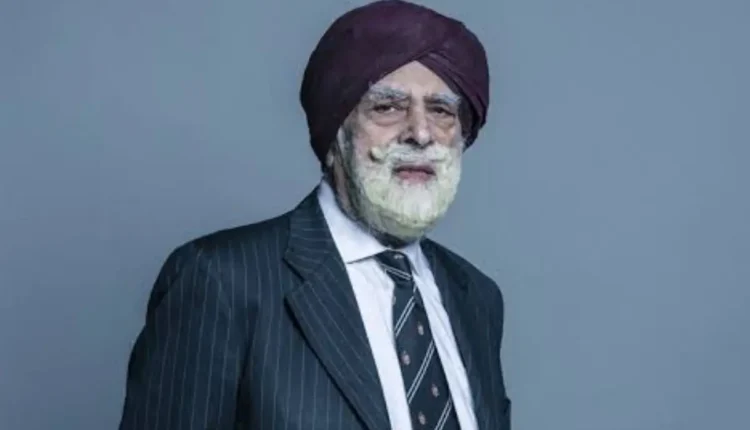Indarjit Singh, Baron Singh of Wimbledon, CBE, is a name synonymous with dedication, wisdom, and interfaith harmony. Born on September 17, 1932, in Rawalpindi, then part of British India, Lord Singh’s journey is one of profound impact and unwavering commitment to community and faith.
Indarjit Singh’s contributions as a British journalist, broadcaster, and a prominent figure in Sikh and interfaith activities have left an indelible mark on society.
Early Life and Education of Indarjit Singh
Indarjit Singh’s journey began in Rawalpindi, Punjab, where he was born into a family deeply rooted in service. His father, a medical doctor, relocated the family to England in 1933, seeking better opportunities and a brighter future.
Growing up in England, young Indarjit attended Bishop Vesey’s Grammar School in Sutton Coldfield. His academic prowess and determination led him to pursue engineering at Birmingham University, laying the foundation for a career that would span various fields and make a significant impact.
Career in Engineering and Civil Service
Upon completing his studies, Singh embarked on a career in mining and civil engineering. From 1955 to 1975, he worked with the National Coal Board and later for Costain as a mine manager in India.
His expertise and leadership skills were further honed through his work in local government in London. These years of hands-on experience in engineering and public service instilled in him a deep understanding of the importance of infrastructure and community development.
Advocacy and Interfaith Leadership
Indarjit Singh’s passion for advocacy and interfaith dialogue became evident as he took on advisory roles in various official bodies. He served on the Commission for Racial Equality and the Home Secretary’s Advisory Council on Race Relations, contributing to the development of policies promoting equality and understanding.
As the Director of the Network of Sikh Organisations (UK), he represented the Sikh community at significant civic occasions, including the Commonwealth Service and the Remembrance Day Service at the Cenotaph in Whitehall, London.
Prominence in Broadcasting
Singh’s eloquence and depth of knowledge made him a sought-after voice in the media. He became a familiar presence on BBC Radio 4’s “Today” programme, presenting the “Thought for the Day” segment, and on BBC Radio 2’s “Pause for Thought.”
Indarjit Singh’s insightful contributions resonated with listeners, earning him respect and admiration. Despite editorial disagreements leading to his departure from the BBC in 2019, his legacy in religious broadcasting remains influential.
Honors and Recognitions
Indarjit Singh’s contributions have been widely recognized and celebrated. In 1989, he received the Templeton Award for services to spirituality, followed by the Interfaith Medallion in 1991 for his work in religious broadcasting.
Indarjit Singh‘s dedication to fostering understanding between different faiths earned him numerous accolades, including an honorary doctorate from the University of Leicester in 2004. In the same year, he came second to Bob Geldof in BBC Radio 4’s “People’s Lord” poll, a testament to his popularity and impact.
Elevation to the House of Lords
Singh’s tireless efforts and distinguished service were further honored when he was appointed Commander of the Order of the British Empire (CBE) in the 2009 New Year Honours. On October 12, 2011, he was created a Crossbench life peer, taking the title Baron Singh of Wimbledon.
His introduction to the House of Lords marked a historic moment as he became the first member to wear a turban in the chamber. His coat of arms, adorned with a baronial coronet and the Khanda as his crest, symbolizes his Sikh heritage and commitment to service.
A Voice for Sikh and Interfaith Communities
Throughout his life, Lord Singh has been a prominent advocate for the Sikh community and interfaith dialogue. As a patron of the World Congress of Faiths and an executive committee member of the Inter Faith Network UK, he has played a crucial role in fostering understanding and cooperation between different religious communities.
His participation in high-profile events, such as the wedding of Prince William and Catherine Middleton and the Coronation of King Charles III and Camilla, underscores his significance as a representative of the Sikh faith.
Continuing Legacy
Even in his later years, Lord Singh’s influence remains strong. His contributions to British and international newspapers, including The Times, The Guardian, and The Independent, continue to enlighten and inform readers. His life’s work, characterized by a commitment to justice, equality, and spiritual growth, serves as an enduring source of inspiration.
Also Read:Sonia Birdi: Leading the Charge Against Corruption in Kenya

